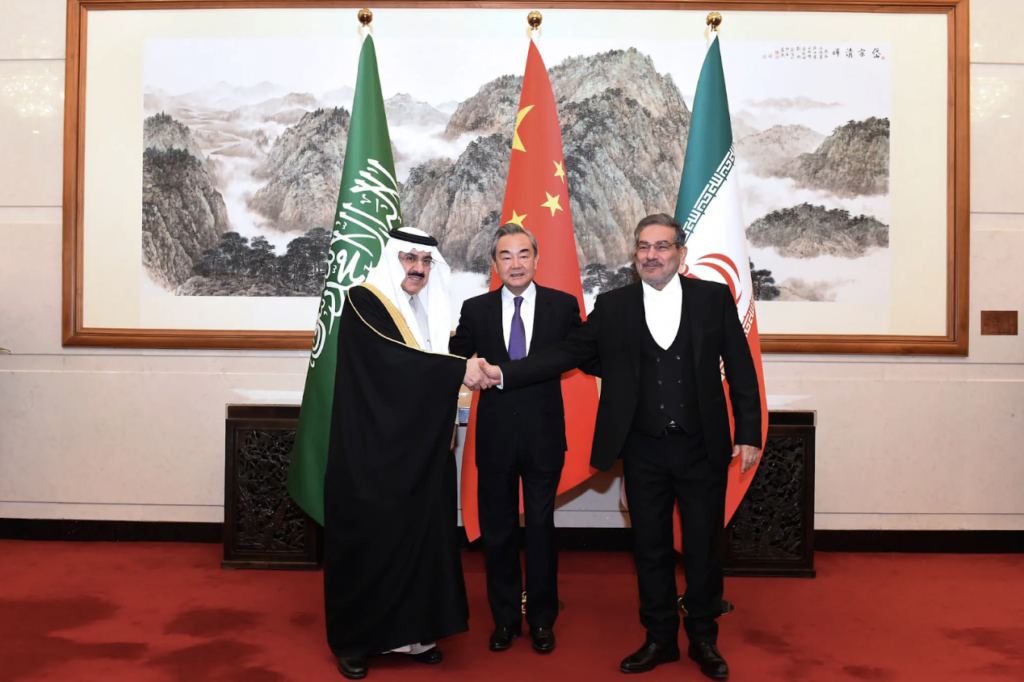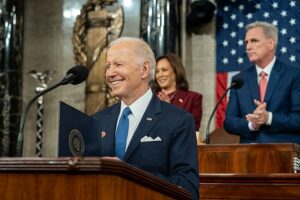Gulf Peace: China’s Progress and U.S. Standstill
While US Defense Secretary Lloyd Austin was visiting the Middle East, delegations from Iran and Saudi Arabia secretly visited Beijing and achieved diplomatic success in easing tension in the Gulf.

Image Credit: Luo Xiaoguang/Xinhua via The New York Times
While US Defense Secretary Lloyd Austin was visiting the Middle East, delegations from Iran and Saudi Arabia secretly visited Beijing and achieved diplomatic success in easing tension in the Gulf. On March 10, Iran and Saudi Arabia signed a trilateral statement with China, wherein the two Gulf Arab states agreed to re-establish diplomatic relations and reopen their respective embassies within two months. The time frame may be limited, but change is happening. The statement provides a starting point for future discussions on conflict resolution between the two states.
The statement is also a significant diplomatic victory for China. The significance is based on three dimensions: First, it is the first time China has mediated a complicated regional conflict without the participation of other world powers. In the history of Chinese diplomacy, China has only ever facilitated political reconciliation between two or more states when it was a part of the conflict or within the framework of the UN. Second, the long and complicated conflict between Iran and Saudi Arabia makes the statement invaluable. The execution of Sheikh Nimr Al-Nimr by Saudi Arabia and the ensuing riot at Saudi Arabia’s embassy in Tehran interrupted diplomatic relations between the two states. This stems from the longstanding ideological conflict between Shia and Sunni, which dates back to Iran’s provocation of sectarian rivalry within Saudi Arabia after the Islamic revolution. Aside from sectarianism, the geopolitical ambitions of the two states also play an essential role in this protracted conflict. Both states want to claim the leadership of the Gulf region and have attempted to expand their power and influence through proxy wars in Lebanon, Syria, and Yemen. Third, it is a challenge to the US’s unique status of mediating regional conflict in the Middle East. Although most major conflicts were solved under the UN framework, the US has played a significant role in mediating Middle East conflicts, from the Camp David Agreement to the Abraham Accord. However, this monopoly is increasingly challenged by China’s participation in regional peace affairs.
China’s success raises the question: Why can China successfully mediate the Iran-Saudi conflict? The mutual willingness to bring an end to diplomatic severance, as well as the diplomatic efforts of Iraq and Oman, were all critical factors in bringing about this new development in Iran-Saudi relations. However, the most crucial roles lay with two extra-regional powers – China and the US. China has increasingly placed greater importance on its relationship with both Iran and Saudi Arabia and increasing its security capabilities in the region. A close and neutral relationship with both Iran and Saudi Arabia is crucial for the Chinese success of the mediation. Iran has signed and started to implement its 25-Year Comprehensive Cooperation Agreement with China, which includes several hundred billion dollars of investment in energy, finance, transportation, and housing. During Chinese President Xi’s visit to Saudi Arabia in 2022, the two states signed a comprehensive strategic partnership agreement that included several vital investments and security cooperation. China is the biggest oil buyer and trade partner for both states. Although close cooperation exists between the two states and China, Beijing tries to keep a balance between its bilateral relations with Tehran and Riyadh. For example, China invited Iran to join the Shanghai Cooperation Organization but also admitted Saudi Arabia and Qatar as observer states. Furthermore, China is an important participant in the defense capabilities of both states. It provides Beidou navigation systems for Iranian missiles. It also helped set up Saudi Arabia’s missile system with its DF-3 and DF-21 missiles and has sold Wing Loong II drones and built the R&D and production capability of drones in the kingdom. The development of Chinese security capabilities in the region has made China a reliable mediator that has contributed immensely to its diplomatic success.
The decline of US aspirations and reputation in regional security issues is another crucial factor for Chinese diplomatic success. The US is still the strongest participant in the region; however, its strategic posture has shifted to place most of its resources in competition with China in the Indo-Pacific, which has undermined the trust of the US’s commitment among Middle Eastern allies and partners. The disastrous withdrawal from Afghanistan has only strengthened doubts about the US’s security commitment in the Middle East, forcing its Middle Eastern allies to decrease conflict and find cooperation with foes. While the US should have responded to the aftermath of this contraction by strengthening its regional security partners, it failed to demonstrate sufficient security support for its regional allies and partners. The continuous attack on oil fields and other critical infrastructure by Houthi militias made Saudi Arabia and the United Arab Emirates (UAE) question US protection in the region. The Biden administration’s lack of commitment to support Saudi Arabia’s attack on Houthi militias only strengthens the distrust of US security commitment. The restriction of selling offensive weapons has only further inflamed that distrust. The Biden administration halted the sale of precision-guided munitions that had been approved by the Trump administration and stopped the sale of F35s to the UAE after President Biden took office. Although the US has approved the sale of the PATRIOT air defense system to Saudi Arabia, this inadequate compensation fails to fulfill the country’s needs. Anti-aircraft missiles cannot shoot down 100 percent of Houthi drones, but precision strikes on the mountains of northern Yemen can contain Houthi operations. As a result, when the security provided by the US is not enough of a guarantee or carries a high risk of confrontation with Iran, compromising with foes is another solution for states on the edge of high-cost conflicts.
Although the trilateral statement is meaningful for both conflict participants and China, there are some that view this statement as less momentous than Chinese propaganda suggests – that the trilateral statement may be strong in symbolic meaning but fragile in practice. In the view of the Iranian newspaper Fararu News, there is a lack of confidence in “grand peace” and a win-win formula between Iran and Saudi Arabia. Many sensitive issues exist on the road to broader moderation between Iran and Saudi Arabia. The nuclear issue is the most significant one, and Saudi Arabia is seeking more assurance that Iran will not possess nuclear weapons. The geopolitical competition is another critical threat to the broader peace between Iran and Saudi Arabia because it involves other states and non-state actors that are not following Riyadh and Tehran’s will. The statement threatens Israel’s national security interests and places more uncertainty on the state of Saudi-Israel relations. Yemen’s Houthis or Shia militias in Iraq may not accept the signal of moderation from Tehran. As a result, their continuous hostile acts may create political crises for the practice of trilateral statements.
The trilateral statement is undoubtedly a diplomatic victory for China in the Middle East. Although it has several limitations, the progress reflects two facts: the rise of China’s comprehensive capabilities in the region, and the sluggish, if not decaying, condition of US regional influence. The US’s hostile relationship with Iran means that Washington is unlikely to achieve a similar agreement, but that does not mean that the US cannot give sufficient security commitments to its regional allies and partners. In fact, the US is still the number one security provider in the region. However, the strategic incoherence and sluggish policies of the US have left enough room for China and Russia’s involvement in the Middle East. China might not be the ideal friend and partner of the Middle East, but the US shapes its ideal image. The hesitant attitude and movements of the US make China an acceptable and effective choice for states in the region looking to improve upon the status quo.
Zhiyu Jiang (he/him) is a first-year MA student in International Relations Program. He received his BA in Arabic and Middle East Studies from Sun Yat-Sen University, China. He has worked as a research assistant in the U.S. policy center of Intellisia Institute. He also has experience in collecting Arabic news for the media. His academic interests concentrate on Sino-U.S. relations, great power politics and its affection in the Middle East, the modernization process of states in the Middle East, and the formulation of modern countries. He always spends too much time reading novels, watching Anime, playing video games, and cooking. He also enjoys Chinese calligraphy and has experience in Arabic calligraphy.






